Queen of Dragons d-3 Read online
Page 3
It had not been done in generations. The Gifts were growing rarer and rarer, and no one even knew why.
She had felt so special. She had been so delighted. She had not truly realized what it meant. From that minute on her life had been mapped for her, first by her husband and then—resolutely—by herself. And Mari had thought, for a while, that she had carved her path deep enough and sure enough to thwart any new changes. That she was safe now, that her fate was secure. She had nearly twenty years behind her, and thought she knew how to bend the very mountains to her will.
Until six months ago, when her nights began to vanish.
The sky beyond the window was lifting into a sheer, bottomless azure. It was going to be a sunny day. The snowdrifts in the courtyard were already blinding, which is why she heard the crumping footsteps of the approaching party of men before she saw them. She looked out, squinting, then lifted a hand to shield her eyes.
Five men at the gate, huntsmen, carrying a dark something between them. A deer, most like. Or a wild boar. She sighed and closed her eyes, leaning her temple against the glass. She felt unwilling to witness more death, even accidentally.but when she opened them again the men were closer, and the thing they carried had one limp, pale hand trailing the air.
Maricara was not the first to reach them. The doormen had gathered in the courtyard already, along with two milkmaids, and four of the grooms. They parted at her approach, lips compressed, heads ducked. In her haste one of the maids slipped in her wooden clogs; the liquid from the bucket balanced on her head splashed into invisible drops against the snow.
The dark shape was a man. His skin was oddly gray, his hair flaxen, his eyes glazed and open. As she walked nearer the light shifted. She realized that what she had perceived as gray was actually frost, a frozen sparkle across his cheekbones and whiskers and straw-colored lashes. He was comely and somehow familiar, dressed well in a torn Parisian coat and boots that looked new. The hand that had trailed free wore a signet ring of gold. Clearly not a serf.
"Who was he?" she asked, looking up at the huntsmen.
"Noble One." The headman nodded to her, not lifting his eyes. "My deepest apologies. We don't know. We found him on the road before dawn. No horse or carriage, no papers."
"Where?"
"The woods, my lady." "Where?" she asked again, sharper. "Deda," muttered another man. "Near to Deda."
Mari blinked, but that was all. She gestured for the hunters to lay the man down, knelt beside the body—the ground an icy jolt against her knees—and opened the coat. It was stiff with blood, glittery and dark. No need to guess at the source: The gash that had torn the greatcoat had also pierced his coat and waistcoat, and even deeper, enough to reveal the skin beneath, his chest. What would have been his heart.
Maricara sat back on her heels. She looked down and noticed a flake of frozen blood upon her stomacher, and flicked it hard away.
"This was the work of men," she said aloud, and then glanced up at the faces surrounding her. No one met her gaze. One of the milkmaids was staring, whey-faced, at the ravaged waistcoat, her eyes wide and watering.
"Men did this," Mari insisted, and came to her feet.but she was forced to remain still a long moment, fighting a wave of dizziness that washed the color from her sight and sent electric barbs down into her fingertips.
Do not faint. Do not. Do not surrender here.
She set her jaw and, when she could, gestured once more at the huntsmen. They roused, blowing clouds and exchanging looks, stumping closer to the body. This time when they lifted it Mari made herself touch that cold hand, to fold it over the stranger's chest.
The band of the signet caught her eye. She worked the ring around the knuckle until its face was upright, until she could make out the design carved into the metal.
A dragon, wings out, fangs bared, entwined against the letter D.
She knew that crest. She'd seen it exactly three times before in her life, carved carefully into wax on the letters from England. From the Earl of Chasen.
This man had been an Englishman. And a dragon.
Someone, somehow, had managed to kill a drakon.
God help her if this was the earl himself.
"Take it to—to the granary. You, summon the prince. You five—go! Are you listening? Stay with it until His Grace arrives. Let no one else come near."
"Yes, my lady."
"The rest of you—have you not work to finish? Cows do not milk themselves, as I recall."
She watched them as they scattered, watched until she stood alone in the courtyard beneath the sightless eyes of all the windows of Zaharen Yce. A long, spiraled lock from her wig blew lazily against her left forearm: gray, like the dead man's skin.
Mari could hear the pines rustling in the mountains, and birds shifting in their nests, and the small heartbeats of all the little creatures burrowed under the earth. She could certainly hear the hissed conversation of the two milkmaids as they hurried back down the walkway that led to the dairy.
"How can she say it was men who did it? How can we be certain it wasn't—"
"Because," answered the other, just as soft, "she wouldn't have stopped with his heart. She would have eaten all of him."
CHAPTER TWO
He'd never liked tea. It seemed somewhat ridiculous to him, to interrupt his day with miniature cakes and dry, crustless sandwiches, and fragile china that always seemed about to snap in half between his fingers. Tea, Kimber reasoned, was a feminine invention, ruled by females of a certain type: ruffled, beribboned, and iron-willed.
At least it was here at Chasen. It was the hour his sisters always paired to outflank him.
"But Kim," Joan was saying in her pretty, reasonable way, "you do realize how impractical it has become. We still have scarcely any idea of even how many of these other drakon there are. If they're as scattered as Lia's letter suggested, we'll waste a good deal of resources merely locating them."
"We have already," Audrey pointed out, taking a sip from her ridiculous, dainty cup.
"And to what results?" Joan responded, a perfectly timed counterpoint. Kim knew from experience they could go on like this for hours. "Rumors and hearsay. A smattering of frightened peasants who can barely string together a full sentence in French. No castle. No certain means of even ascertaining how the letters from the princess had managed to reach us, or ours to her. It's as if they manifested from thin air."
"Like smoke," said Rhys quietly from his corner chair, and returned Joan's glance with innocently raised brows.
Kimber regarded his siblings in silence. He supposed it did him some good to be challenged, even in such a sugar-coated, sideways manner. If nothing else, he could count on these Wednesday afternoons to sweep away the illusions of his station from his mind and remind him, quite firmly, that although he was the leader of his tribe, to these particular three people he was still family.
And that was good, he told himself. He eyed the tepid Ceylon in his hand. Surely it was good.
Very gently, he set the flower-painted teacup upon the table at his feet. The butter yellow of the cinquefoils was an exact match to the edging of the Westmorland rug, and the Swiss applique curtains that framed the parlor windows and glass garden doors. Everything in this chamber, in fact, was premeditated and coordinated, right down to the iced cakes—also yellow, with tiny pink marzipan roses swirled on top.
Chasen Manor was nothing if not vigorously well planned.
He longed for water. Or wine. Or even cider. He longed for plain bread and cheese and a decent slice of meat.
Joan, seated beside him on the settee, leaned forward to pour fresh tea into his cup, then added a wedge of cucumber sandwich beside it. Beneath her lace cap her curls glinted in the light of the candelabra; like Kimber, she had inherited their father's coloring, green eyes and dark golden hair.
Unlike Kimber, she usually cared enough about what other people thought to take the trouble to powder it.
"I am merely suggesting," she was saying, "that before we co
mmit further to the council's scheme of finding and controlling these Zaharen, we take a breath, so to speak, and consider all the implications."
Rhys spoke again. "You act like he has a choice. You act like Kim controls the council."
"Well," countered Joan, "he is Alpha, since Father is gone. He could tell the council at their next meeting—"
"What," interrupted Rhys, impatient. "Tell them what? That until this princess decides she wants to trust us enough to send us her direction, we'll just have to sit on our hands and simply hope none of them decides to reveal to the world exactly what we are? Where we live? That we should wait for bloody Lia to show up, or Mother and Father to come home, and all our secrets will be safe? The tribe is teetering at the edge of reason as it is. You know damned well the council made the best decision possible given the—"
"Sending three of our men over to the Continent with little or no information on how to navigate to this castle—forbidding them to use their Gifts to help discover these other drakon—" "We've only done what we've had to do to survive—"
"You say that because you're on the council, so it's very well for you to claim you know what's best for all of us—"
"Stop fighting," Kimber enunciated, very calm, but it silenced them both like a bullwhip cracked across the room.
The lives of every single drakon, male or female, young or old, were bound tight with rubric and tradition. It was necessary; with their many Gifts came also many enticements. But they had endured the centuries by learning to hide. They had endured by following their own rigid laws and by vigorously punishing anyone who defied them. Once upon a time, everyone knew, their kind had been hunted nearly to extinction. It was only by pulling order out of their chaos, by banding together here in Darkfrith, creating their own careful universe, that they had managed slowly, slowly to thrive.
They had an Alpha to lead. They had a council to govern. They had rules upon rules, the first and foremost of which were: loyalty to the tribe. Silence.
Confinement.
It was bred into their blood and into their bones. Confinement meant continuance. It meant farms and orchards, mills and smiths and schools, and black-deep mines laden with silver. It meant crops, and trade. It meant the drakon could mingle with the Others when necessary, that they could be simple country folk to anyone who didn't look too long or too deep at the pastoral perfection of the shire.
Some people did. Only a few. A very, very few.
And then had come that letter from Lia—runaway Lia—along with that of the princess. And on that day the tribe had realized that everything they had worked for, all the generations of struggles and sacrifices, might soon be for naught.
There were more of them out there, running free and uncontrolled. There were more drakon, foreign and wild, and no one in Darkfrith had ever known.
The news had struck a tremor of fear through the shire like nothing else in their history.
Two years ago the Marquess and Marchioness of Langford had broken their own rules and vanished into the human world in their final hunt for their youngest daughter, an act that had very nearly managed to rend the tribe into pieces. Before the Zaharen had come to light, runners were considered the most dangerous of all possible threats. A drakon who fled the shire without permission was desperate, unpredictable. It was nearly inconceivable that the established Alpha of the tribe and his wife would do such a thing, even in search of their child.
Kimber had been left behind, just like Audrey and Rhys and Joan. He had stepped into his father's role because it was what he'd been born to do, what he'd been trained to do, and to ignore the crisis of the tribe would have been, quite simply, unthinkable.
He'd been granted rights and privileges not given to anyone else, not even his brother and sisters, because he was the eldest son. He'd been shipped to Eton as a boy, then to Cambridge, had mingled with nobles and thieves and, five times, the king himself, all because of who he was destined to be. He was a leader and a lord, shaped for this role the entire sum of his life. And his family, his comrades and kin, had been shaped as well.
The Alpha ruled the drakon. Kimber was the new Alpha. When he spoke, his kind obeyed. It was their way.
Joan had lowered her gaze to the teapot, a sullen slant to her lips. Rhys had subsided back into his chair, his hair a brown tangle against the damask, his arms crossed, and was staring up at the painted cornices along the ceiling. Only Audrey, Kimber's twin, fixed her dark gaze to his and then pursed her lips to speak.
"I saw Zoe Lane in the village the other day," she said, matter-of-fact.
Zoe Lane. Kimber didn't need to scan his memory to place her: She was the fiancee of Hayden James, young, striking. Blond, like most of their kind. Pale, like all of their kind. He remembered her stoic face as she'd bid Hayden farewell a year past, on the manor drive that unspooled to the outer world. He remembered seeing her later that evening at her sister's tavern, where sometimes she worked, and how red her eyes had been, even by candlelight.
Like Jeffrey Bochard, the man sent out two years before him—and Luke Rowland before him —Hayden James had simply disappeared.
Just like Lia. Just like Kim's mother and father.
"No one blames you," Audrey said softly. "It isn't your fault, of course."
And as soon as she said that, Kimber knew she thought it was.
She was right.
He rose from the settee and walked to the beveled-glass doors, gazing out into the garden, the woods spreading thickly beyond.
If his home was as tranquil and studied as a great deal of money could ensure—and it was—at least the weather was yet beyond the control of the drakon. It was a stormy day, not miserably so, but with a cool, steady spring shower that drenched the earth to black and jeweled the trees and plants that were only waiting for sunlight to bloom. A soft blue fog crept through the vales, winding in fingers and curls along the low-slung hills that surrounded the shire.
He imagined himself out there in that wet. He imagined breathing it, and then becoming it, smoke misted with rain.
He heard Joan straighten on the settee, the firm scrape of her pumps against the floor. "I must be off. Erik can't control the twins for long, and Cook always feeds them too much pudding before bed."
"Yes," said Audrey, also rising. "It's time for me to go as well. I promised the boys a game of backgammon. Rhys?"
"No, thank you. I live here, if you'll recall."
"I meant, dear, will you see us out?"
"No. That's what the footmen are for."
"Such a brute."
"Aye, but at least I'll be dry."
Both his sisters approached and Kim turned around, accepting their brief, rouged kisses upon his cheek. They had houses to return to, families, husbands. They had their fine and ordered lives.
"Next time," he said suddenly, as they were crossing to the door. "Next Wednesday, let's take tea outside, in the pavilion."
Everyone looked surprised, even Rhys, but it was Joan who could switch from tears to smiles in a trice. She gave a bubbling laugh. "Why, Kimber—it's April! It's been raining practically every day. What a mad suggestion."
He looked back at them without speaking, then lowered his lashes and offered half a smile, to let them know he was in on the jest. From behind their sisters, Rhys gave a soft snort.
Then they retreated into the shadows, Joan and Audrey arm in arm, their footsteps measured, striped skirts and fans and cashmere shawls, venturing out into the main hall, and then the graylit storm.
The footmen would only walk them as far as the end of the drive. After that, his sisters would find their own way to their homes. They didn't truly require an escort at all. The thought that someone—anyone—would dare harm them was far-fetched enough to be laughable.
He'd seen them fly, both of them. He'd seen their claws and their deadly stealth. Individually they were remarkable enough, the only two females still in the shire who could Turn. As a pair, they were formidable.
Rhys
waited until they were gone, until they both heard the massive wooden doors of the mansion close with their particularly well-oiled click.
"They're getting worse," his brother said.
"I know it."
"Soon they'll be demanding seats on the council." " That," said Kimber, "would be worth seeing."
They shared a look. The council was governed by men—in Kimber's mind, a majority of ancient, surly men—and always had been. Females weren't even allowed to attend the meetings, something Kim's mother had found particularly galling. But like every other aspect of life here, the rule was ironclad.
He wondered if anyone else knew what he did: that Rue Langford had taken to knitting during the council sessions, her chair positioned close to the hearth in the Blue Parlor, which shared a common wall with the council's private chamber. Kim had received more than one lopsided scarf in his packages from home while at Eton, and a great deal of understated irony in his mother's letters.
They should have let her join, he thought suddenly. Perhaps she might have stayed if they had.
The rain began to intensify. It speckled the glass and slid downward in silvery tears, smearing the fog and the trees and the grass into plots of muted colors. The light from the candles lent a warm soft circle to their little corner of the room.
Rhys flopped back into his chair. He was two years and a lifetime younger than Kim's thirty-one, handsome, poetic in the way only a second son could be; a single, flawless emerald dangling from one ear; a pirate's heart beating beneath white lawn and a waistcoat of Italian silk.
"Tell them I'm going," he said. "You can do that. Tell the council."
"No." "Kim—"
"I am not having this conversation again with you."
"Actually, you are. Look here, I speak French, Italian, and German; I fence; I'm a deuced fine shot, as you know. I've pored over the maps and I think I have a fair idea of where this castle might actually be. There are only a certain number of roads that lead to—"
Kimber's patience snapped. "Pray do not be an idiot. Mother and Father are gone—the marquess and his mate missing without word, their youngest daughter allegedly wed to a human and nowhere to be found—three tribesmen have vanished—even if I wanted to let you go, the council would never permit it. Too many of our family have disappeared already. We've effectively lost six members of the tribe due to our charming little princess. I don't fancy the headache of convincing the council that you'll be the one to miraculously return."

 The Second Mrs. Astor
The Second Mrs. Astor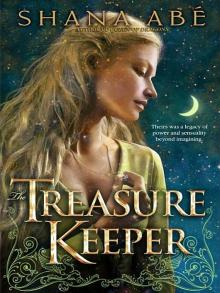 The Treasure Keeper
The Treasure Keeper The Deepest Night
The Deepest Night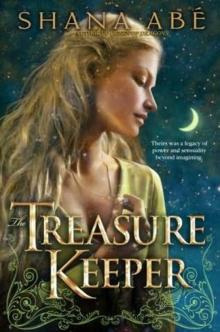 The Treasure Keeper d-4
The Treasure Keeper d-4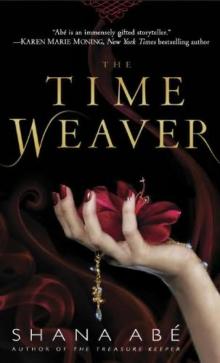 The Time Weaver d-5
The Time Weaver d-5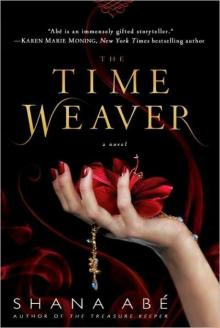 The Time Weaver
The Time Weaver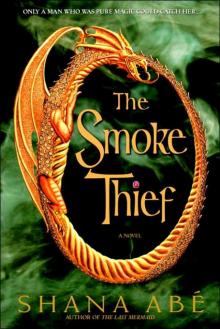 The Smoke Thief
The Smoke Thief The Sweetest Dark
The Sweetest Dark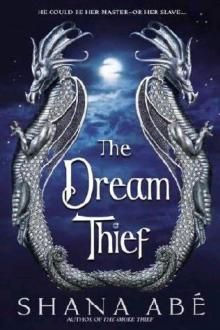 The Dream Thief
The Dream Thief The Deepest Night tsd-2
The Deepest Night tsd-2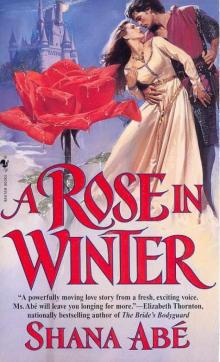 A Rose in Winter
A Rose in Winter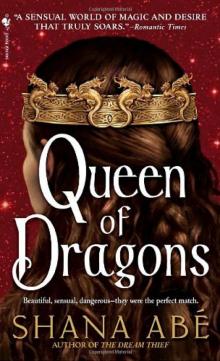 Queen of Dragons d-3
Queen of Dragons d-3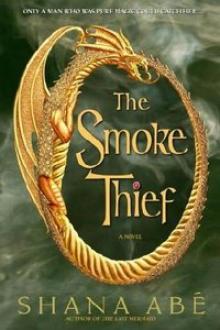 The Smoke Thief d-1
The Smoke Thief d-1